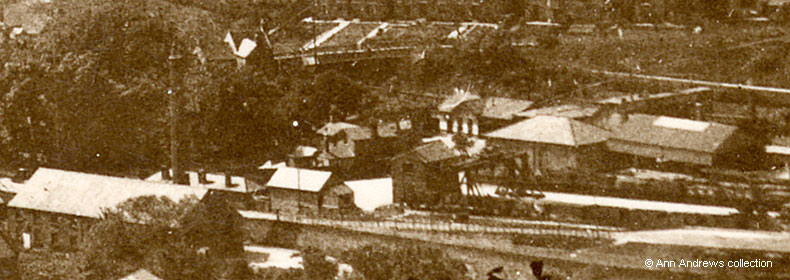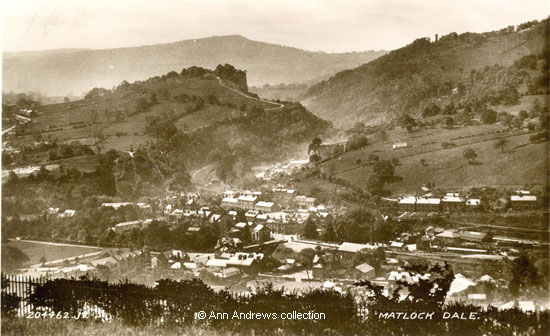|
Images Index> Matlock, 20th and 21stC Images> This page |
| Matlock: Looking south from Jackson Tor, 1928 |
| Matlock : Twentieth Century Photographs, Postcards, Engravings & Etchings |
|
|||
|
 Enlargement of the County Bridge, Crown Square and Bakewell Road |
||
The building with the two centrally placed chimney stacks on the photographer's side of Bakewell Road would have been Allen's Garage in 1928. Their stables, later garages are behind the main building. Next to it is an undeveloped area with a gap in the wall providing access. This was then known as Bateman's Park. On this land, next to Allen's Garage, are what look like trestle tables which were presumably market stalls. It wasn't until 1952 that the bus station was built and opened next to the market. |
||
 Enlargement of the station goods yard and, on the left, what had been the Rag Mill, later Poyser's and the works of the Curtis Cultivator Co., Ltd. |
||
|
In the station goods yard there was a heavy hoist, substantially built for large loads such as slabs of stone or major pieces of machinery. This one appears to be double width to enable loads to be moved from a lorry to a wagon or vice versa. The hoist had a hook, which seems to be suspended from the middle. It was unusual to find such a large hoist in a local goods yard[8].
|
||
|
"Matlock Dale". Published by Valentine & Sons, Ltd., Dundee & London, No.204462J.V. Registered in 1928. This card posted on 11 Jul 1949 in Bamford, Sheffield Message, but not relevant. Postcard in the collection of and provided by and © Ann Andrews. Researched, written by and © Ann Andrews. Intended for personal use only. |
||
References (coloured links are to transcripts or more information elsewhere on this web site): [1] When the Matlock Town Football Club Supporters Auxiliary Association was formed in 1958 the very small upstairs room of this building became the football office which they occupied until about 1979. The building was then owned by the Brewery. With thanks to Susan Tomlinson for contributing this information. [2] William Henry Furniss advertised in Kelly's 1925 Directory - Premier Garage, Bakewell Road, with offices on Causeway Lane; Also Premier Garage, Matlock Bath. [3] The mill chimney can also be seen on Matlock - looking towards Hackney, early 20th Century | Matlock: Holt Lane and Dale Road, about 1900 | The Popular Album of Matlock. You have to look hard, but it also can be seen on Matlock Bank and Bridge, 1900-02 (second image) and Matlock Bank, the Hall Leys and Dale Road, 1912-14 (top image). There is another view of the rag mill on The Bridge (4), and the Broad Walk. [4] "Derby Daily Telegraph", 5 March 1934. Local inventions. [5] "Derby Daily Telegraph", 11 November 1937. The fire was not discovered until the flames actually burst through the roof and, despite the prompt response from the fire brigade, the only this that could be saved were items from the office. [6] "Derby Daily Telegraph", 26 November 1937. They applied to the Council to use the former tramway depot building. [7] "Derbyshire Times", 24 November 1939. [8] With grateful thanks to Andy Andrews
for providing the hoist information. |





 Also see:
Also see: